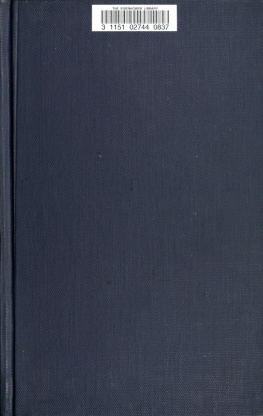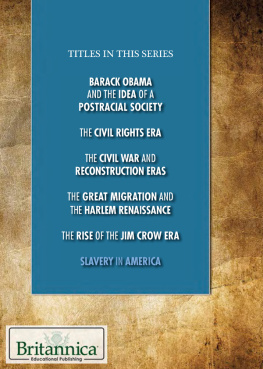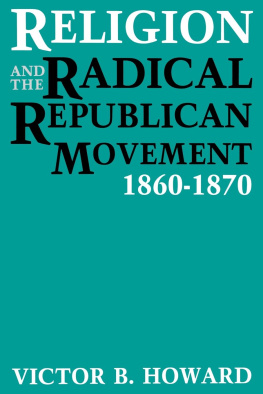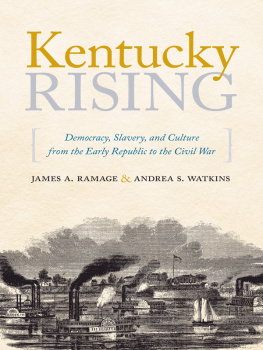Publication of this volume was made possible in part by a grant from the National Endowment for the Humanities.
Copyright 2003 by The University Press of Kentucky
Scholarly publisher for the Commonwealth,
serving Bellarmine University, Berea College, Centre
College of Kentucky, Eastern Kentucky University,
The Filson Historical Society, Georgetown College,
Kentucky Historical Society, Kentucky State University,
Morehead State University, Murray State University,
Northern Kentucky University, Transylvania University,
University of Kentucky, University of Louisville,
and Western Kentucky University.
All rights reserved.
Editorial and Sales Offices: The University Press of Kentucky
663 South Limestone Street, Lexington, Kentucky 405084008 www.kentuckypress.com
The Library of Congress has cataloged the hardcover edition as follows:
Tallant, Harold D., 1956
Evil necessity : slavery and political culture in antebellum Kentucky / Harold D. Tallant.
p. cm.
Inclues bibliographical references and index.
ISBN-10: 08131-2252-X (acid-free paper)
1. SlaveryKentucky. 2. Political cultureKentucky. 3. KentuckyPolitics and government17921865. I. Title.
E445.K5 T35 2002
326'.09769dc21 2002152767
ISBN-13: 9780-81312252-6 (cloth : alk. paper)
ISBN-13: 9780-81319214-7 (pbk. : alk. paper)
This book is printed on acid-free recycled paper meeting the requirements of the American National Standard for Permanence in Paper for Printed Library Materials.
Manufactured in the United States of America.
| Member of the Association of
American University Presses |
Preface
This book is a study of the slavery controversy in antebellum Kentucky, one of the few slave states where genuine debate about the benefits and existence of slavery continued right up to the Civil War. It looks especially at the influence of a distinctive ideology of slavery, the theory of slavery as a necessary evil, which ironically both promoted dissent against slavery in Kentucky and thwarted effective action against it. This study focuses on the years from the formation of the Kentucky Colonization Society in 1829 to John Browns Raid in 1859, a period which begins with the necessary-evil theory at the height of its popularity and influence in Kentucky, and ends with the bitter and definitive southern reaction against all antislavery activity, just months before the Confederacy went to war to protect slavery.
A brief word is in order to explain the methods I have used in quoting other sources. I have changed ampersands in the original texts to the word and, and occasionally altered the initial capitalization and terminal punctuation of quotations in accordance with common scholarly practice. Otherwise, I have retained the original form of quoted material, including italics and other forms of emphasis.
During my work on this project, I have become indebted to a number of individuals and institutions who lent support to my work. Librarians at the following institutions greatly aided my research efforts: Duke University, the University of North Carolina at Chapel Hill, the Historical Society of Pennsylvania, Indiana University, Florida State University, Emory University, the Library of Congress, Fisk University, Vanderbilt University, Western Kentucky University, the Louisville Free Public Library, the University of Louisville, Southern Baptist Theological Seminary, the Filson Historical Society, the Kentucky Historical Society, the University of Kentucky, the Lexington Public Library, Lexington Theological Seminary, Morehead State University, Centre College, Berea College, the Scott County Public Library, and Georgetown College. The Lost Cause Press kindly provided me with microcard editions of several very rare pamphlets and books.
Several institutions gave me financial and material support for research and writing. The Department of History at Duke University provided financial support for this project, and Dukes Management Information Services gave me special access to computer equipment. Georgetown College supported this project by providing sabbatical leaves and by partially underwriting the costs of photocopying, travel, student help, and research materials.
I also owe thanks to several scholars. At various stages of the writing process, John F. Hoadley, Daniel Feller, Raymond Gavins, Michael Morrison, David E. Price, Richard L. Watson, and Major Wilson read and commented on portions of the manuscript. Clark R. Cahow gave a close reading to an early version of the manuscript and provided generous financial support during the years I assisted him with teaching and research. Robert F. Durden helped shape the formative stages of my thinking on slavery, directed the dissertation, and did more than any other person to improve my writing skills. William W. Freehling and Marion B. Lucas gave valuable advice which guided the final revisions to the manuscript. Special thanks go to Lindsey A. Apple and James C. Klotter. Lindsey, as department chair during most of my years at Georgetown College, provided constant support and encouragement for research and writing. Jim provided sound advice about writing and took time from his own book project to give the manuscript a thorough reading with the eyes of an experienced editor and master historian.
A project like this requires the support of friends and family, something I have had in abundance. Two friends, Tony and Bertha Busseni, took a special interest in this project and, probably without knowing it, prompted me to keep pressing toward the final goal. My in-laws, Wallace and Evelyn Boyd, have been constant encouragers, as have been my sister and her husband, Marilynn and Billie Friel, and my sister-in-law, Linda Root. It is impossible for me to number fully the many contributions to this book made by my parents and by my wife and daughter. No one believed in me more than my father, Harold D. Tallant Sr., whose hope for the completion of this project sustained me through the difficult early writing stages. My mother, Rhoda E. Tallant, also provided crucial assistance during the initial stages of research and suggested several changes that improved the final version of this work. My greatest debt of gratitude is to my wife Ann and my daughter Amanda. Both willingly sacrificed much so that this book could be completed. No one is prouder to see the book finally completed than Amanda. In addition to the emotional sustenance only a spouse can offer, Ann contributed to virtually every phase of this project in some way. Her many contributions to this book are beyond description. And without the loving support of Ann and Amanda, the writing of this work would have been a more arduous and less joyous endeavor.











